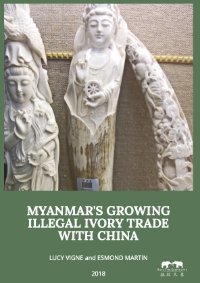Myanmar's Growing Illegal Ivory Trade with China
By Lucy Vigne and Esmond Martin
The report ‘Myanmar’s Growing Illegal Ivory Trade with China’ released today (subs: October 2, 2018) shows that one town in particular, Mong La - a frontier town in the notorious Golden Triangle on the border of China - has experienced a ‘prolific growth’ in ivory trading. The number of new ivory items seen for sale in the town grew by 63% in three years, and now accounts for over a third of the ivory seen in the country.
The report by ivory trade specialists Lucy Vigne and Esmond Martin recounts how Chinese visitors smuggle worked ivory from Mong La back home with little concern about getting caught. This ivory has often come up the Mekong River into the lawless eastern periphery of Myanmar where it is for sale in both retail and bulk. The wholesale price for African raw ivory in late 2017 in the Golden Triangle region has remained stable at about USD 770 to USD 800 per kg since late 2015.
Myanmar has the largest captive, or ‘domestic’, elephant population in the world with over 5,000 individuals. Traders there say that the internal ivory trade is legal for trimmed domestic elephant tusk tips and from licensed animals that have died, and operate accordingly. (Trading in the tusks of the remaining wild elephants in Myanmar – numbering perhaps 2,000 – is acknowledged to be illegal). The ivory from captive elephants is used for local carving and retail sale especially in Mandalay and Yangon. Their tusks are also sold wholesale in Mandalay to Chinese traders, who smuggle them across the China border in contravention of the existing international ivory trade ban.
Traders reported that 90% of buyers were Chinese wishing to smuggle the ivory home, as also found by the same authors in market surveys in Hong Kong (2015) and Laos (2017). In Vietnam (2016) this was estimated to be 75%.
Nairobi, Kenya: Save the Elephants, 2018. 92p.


